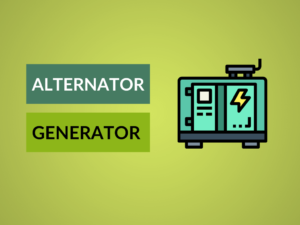Difference Between Generator and Inverter
Are you confused about the differences between a generator and an inverter? Don’t worry, in this article, we will explore both devices in detail and highlight their key distinctions. Whether you are planning for a camping trip or seeking an alternative power source for your home, understanding the differences between generators and inverters is crucial. So, let’s dive in!
What is a Generator?
A generator is a mechanical device that converts mechanical energy into electrical energy. It typically consists of an engine connected to an alternator, which produces electricity. Generators are commonly used in various applications, such as providing backup power during blackouts, powering construction sites, or operating heavy machinery.
Uses of Generators:
- Backup power during emergencies
- Running appliances in remote locations
- Powering construction or industrial sites
- Operating large machinery or equipment
What is an Inverter?
An inverter, on the other hand, is an electronic device that converts DC (direct current) to AC (alternating current). It takes the battery power from a DC source, such as a solar panel or a battery bank, and converts it into usable AC power. This makes inverters highly useful for applications where AC power is required, especially in off-grid solar installations or for powering sensitive electronics.
Uses of Inverters:
- Off-grid solar power systems
- Powering sensitive electronic devices
- RV or marine applications
- Emergency power during power outages
Differences Between Generators and Inverters
| Difference Area | Generator | Inverter |
|---|---|---|
| Noise Level | Generators produce more noise due to internal combustion engines. | Inverters are quieter as they use electronic circuits for power conversion. |
| Portability | Generators are bulkier and heavier, making them less portable. | Inverters are compact and lightweight, allowing for easy portability. |
| Power Quality | Generators produce AC power directly but may have fluctuations and voltage spikes. | Inverters produce high-quality pure sine wave AC power, suitable for sensitive electronics. |
| Fuel Efficiency | Generators consume more fuel due to their continuous operation. | Inverters are more fuel-efficient as they adjust the engine speed based on the power demand. |
| Starting Mechanism | Generators require a manual or electric start mechanism. | Inverters often have an automatic start mechanism for convenience. |
| Cost | Generators tend to be less expensive compared to inverters. | Inverters are generally pricier due to their advanced electronic components. |
| Environmental Impact | Generators emit more pollutants due to their internal combustion engines. | Inverters are eco-friendly as they produce no emissions. |
| Maintenance | Generators require regular maintenance and oil changes. | Inverters require minimal maintenance. |
| Power Output | Generators usually offer higher power output options for heavy-duty applications. | Inverters are suitable for lower power requirements but can be paralleled for increased capacity. |
| Response Time | Generators require a few seconds to start and stabilize power output. | Inverters provide instant power with no startup delay. |
Conclusion
Generators and inverters serve different purposes, each with its own advantages and disadvantages. Generators are ideal for high-power applications and situations where noise is not a concern. Inverters, on the other hand, are more suitable for portable and quieter power needs, particularly for sensitive electronics. By understanding the differences, you can make an informed decision about which option best suits your specific requirements.
Knowledge Check:
- True or False: Generators are quieter than inverters.
- Which device is more fuel-efficient?
- Generators produce which type of power?
- What is the main advantage of inverters over generators?
- Which device emits more pollutants?
- What type of power does an inverter convert?
- Which device requires more frequent maintenance?
- What is the primary application of a generator?
- True or False: Inverters produce a pure sine wave AC power.
- Which device has higher portability?
False
Inverter
Alternating current (AC)
Ability to power sensitive electronics
Generator
Direct current (DC) to alternating current (AC)
Generator
Providing backup power during emergencies
True
Inverter
Related Topics:
- Difference between AC and DC power
- How to choose the right generator for your needs
- Advantages of using inverters in solar power systems
- Understanding inverter efficiency ratings
- Tips for maintaining your generator


